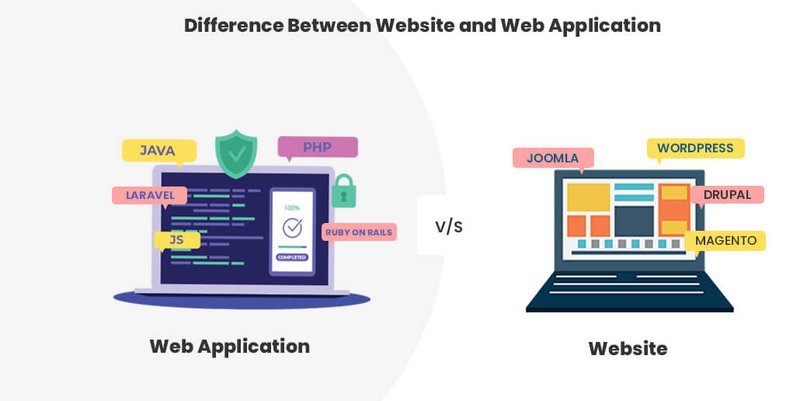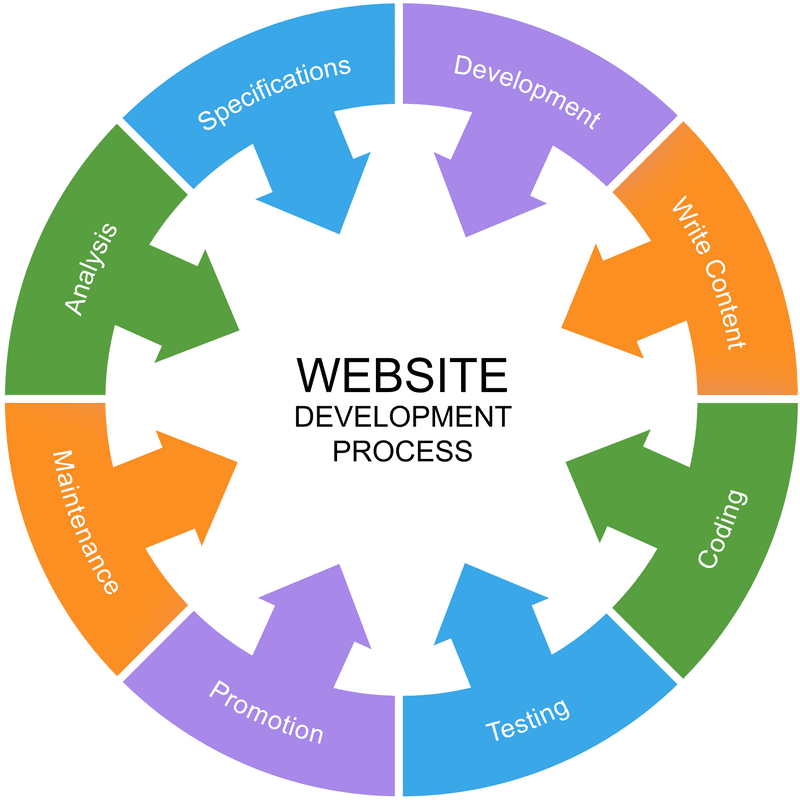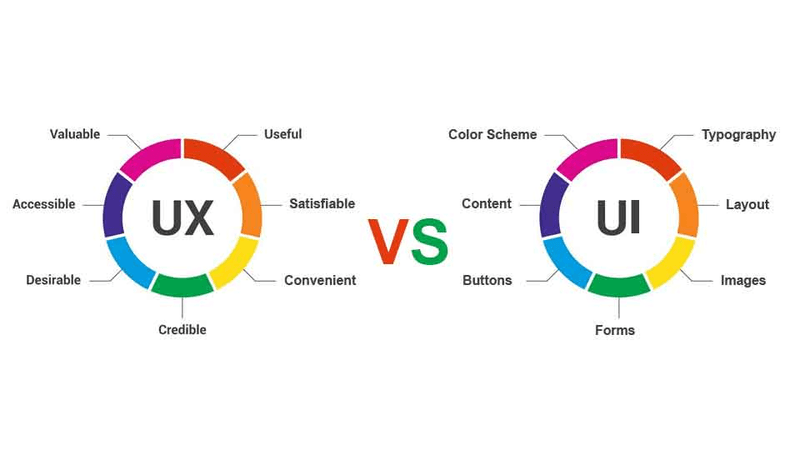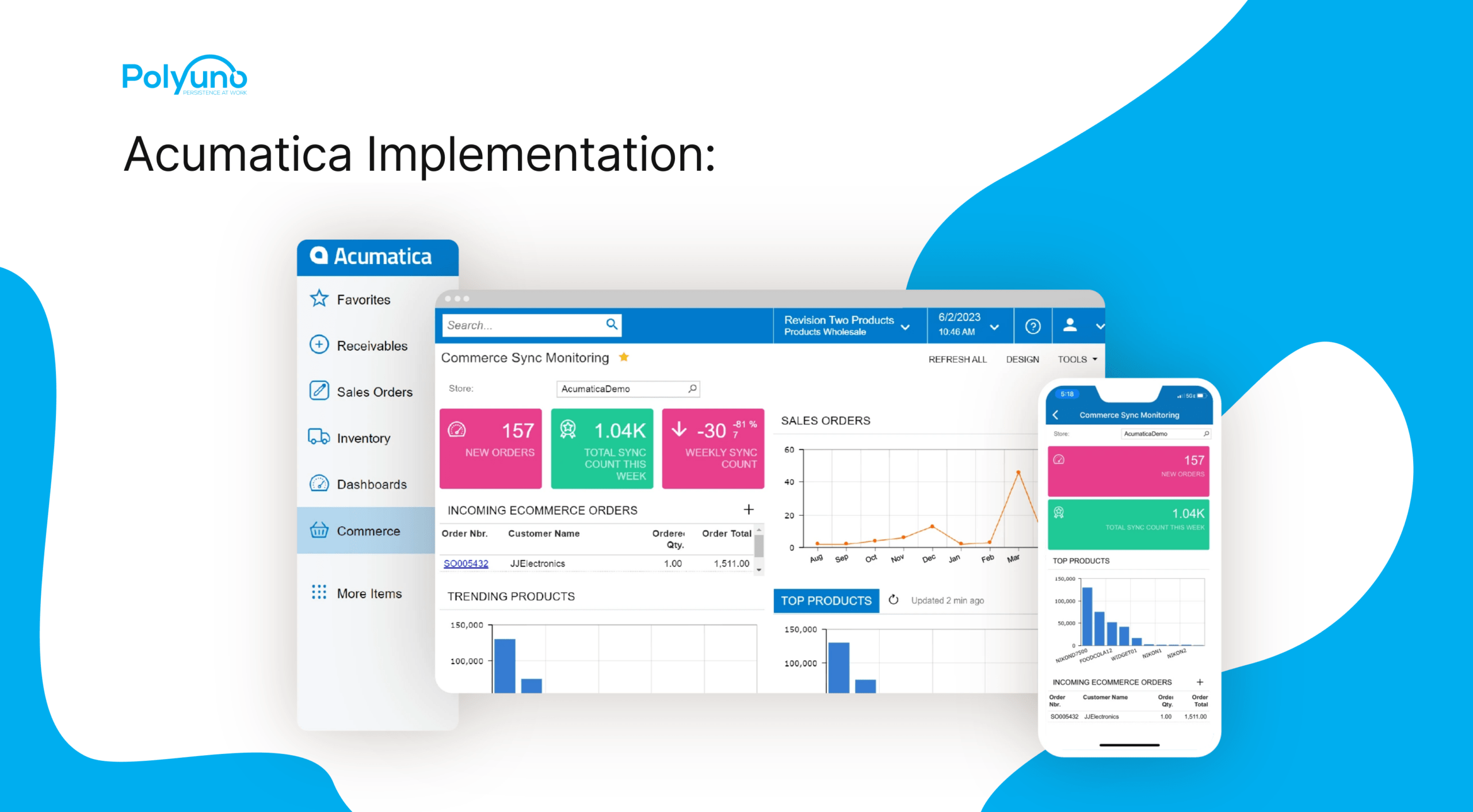When companies want to establish a digital presence, they ask whether they need a website or a web application. Many people believe that anything typed into the browser's address bar will take them to the desired website. The problem is that the URLs you visit might not be for a website. Website and web application Both phrases appear similar to the end-user since the definitions are contentious and overlap.

So, to remedy this confusion, in this article, we will discuss the following:
- What Is A Website
- Why You Need A Website
- What Is A Web Application
- Why You Need A Web Application
- Differences between Website and Web Application
- Advantages Of Websites and Web Applications
- Disadvantages Of Websites and Web Applications
- Conclusion
What Is A Website
A website is a collection of publicly available, interconnected web pages with a specific & single domain name. It can be created and managed by an individual, a company, or an organization. The website intends to serve several functions. They are generally informative. Consider your preferred blog or news website, for instance. They disseminate information to the end-user.

A website is operated on one or more web servers. It can be accessed via an IP address over a network such as an internet or a private local area network.
Types Of Websites
Websites are classified into two types:
Static Websites
These are created with simple programming languages such as HTML, CSS, and JavaScript. They are considered static because they lack a database with which a user can interact. As a result, they show identical material to every user who visits them.
Dynamic Websites
These are more complicated and involve back-end user engagement. In addition to specialized HTML, CSS, and JavaScript. Unlike static, they display changeable content based on a variety of parameters.
Let's look at some instances of websites we possess currently after learning these two primary sorts of websites:
- Dating
- Blogging
- Education
- Portfolios
- Individuals
- The community
- The government
Characteristics Of A Website
One of the essential duties web developers have is to create a user-friendly website. This is because web pages are primarily rated based on how they appear. Therefore, the aesthetic is a significant component in determining how long your website will be able to retain the attention of its viewers.
Here are some pointers to bear in mind when you create a great website:
- First, it should have high-quality content. Remember that visitors are there for your content, so make sure it satisfies their expectations.
- It should be appealing. The implementation of simple design concepts should assist you in giving your site a polished layout and appearance while still providing quality content.
- It should be simple to use. Users will easily find what they are seeking as a result of this. You can accomplish this by, for example, establishing a menu that links to various aspects of the site.
- It should be user-friendly so that your visitors can quickly grasp the site's functionality and intent and understand how to navigate through it.
- It should be quick to load. Make sure your website loads rapidly in strategy to garner more users. Visitors will have a great experience as a result of this.
- It must be responsive. Check that your website is available on all devices. Bear in mind that most consumers do not use PCs but rather smartphones.
Why You Need A Website
Here are the reasons your business needs a website:
- If you are a business owner, a website will enable you to showcase your merchandise to anyone with internet access anywhere in the world.
- It aids in the creation of a presence online where your customers may quickly locate you.
- Revenue can be generated through advertising and monetization.
- You can also create a social proof with it, allowing people to see what you have accomplished and what you are currently working towards. This, in turn, creates goodwill and establishes credibility.
- It will aid in the development of your personal or corporate brand.
What Is A Web Application
A web application is software that can be made available using a browser. A browser is a program that allows you to browse the internet. Authentication is required for web applications. The web application incorporates elements of server-side scripts and client-side scripts to convey information. It necessitates the usage of a server to manage user requests.

Web applications are similar to conventional apps, but the primary difference is that they are kept on the internet and can be made accessible through a browser. In addition, due to the server's high volume of requests, they have a very intimate relationship with it.
Web apps are highly customizable and may conduct a wide range of operations and functionalities within the app, such as producing, viewing, updating, and removing data. They are more sophisticated and more complex to make, necessitating a skilled team of developers.
Characteristics Of A Web Application
A web application's main characteristics include:
- They are scalable and hosted in the cloud.
- The user interface responds quickly.
- Suitable for a wide range of screen sizes and pixel densities.
- They are cross-platform programs, which means they may run on any operating system, including macOS, Windows, and Linux.
- A/B testing and analytics must be supported.
- They should be simple to test using automation.
- Finally, they must be simple to execute.
- Should have an extensive toolkit for logic flows, process flows, debug logs, and so on.
- It must follow best security practices.
Why You Need A Web Application
Most businesses are focusing on web applications instead of websites or using them in conjunction. Here are a few of the reasons why:
- Web apps are simpler to maintain than desktop programs since they use the same code across the application. There are no incompatibilities.
- Web apps can be utilized on any platform that supports current browsers, including Windows, Linux, and Mac.
- Quickly configurable - based on your tastes and user demands, you can easily add more designs and functionality.
- To access the necessary data, you can use either a computer or a mobile device.
- Web-based applications are Internet-enabled apps that may be accessed via the mobile web browser. As a result, you do not need to download or install anything & do not need clearance from any app stores.
- Data is securely stored in the cloud, so you don't have to worry about data loss if your device is broken. Instead, you can quickly get it back.
- Web applications are a low-cost solution for any business. Seat licenses for desktop applications are costly, but SaaS is typically pay-as-you-go.
Differences between Website and Web Application
We have highlighted the Differences between Website and Web Application in some key points below:
Purpose
A website serves an informative purpose, is based on business objectives, and the majority of them are business keynote websites. On the other hand, a web application is designed to assist users in completing a particular activity.
User Interaction
The user of a web application reads the content of the page and manipulates the limited data.
On the other hand, a website delivers visual and text material that users may view and read without interfering with its functionality.
Authentication
Web applications require authentication because they provide a far greater range of possibilities than websites.
Authentication is not required for websites. However, the user may request to register to receive regular updates or to gain access to more options. Uncertified website visitors cannot access this feature.
Development Process
A website is usually simple to establish because it is simply a collection of web pages.

A web application is more challenging to create than a website since it contains multiple users, a higher security threshold, and various data-processing features.
Time To Launch
The time required to construct a website ranges from a week to a month, depending on its complexity and amount of pages. The website type plays a vital role in this case. The development will be faster if the website is static, which means it has static material on static pages. On the other hand, the project will take longer if the website is dynamic.
There are two stages to a web application. The first is the MVP (minimum viable product), which is the fundamental functionality required to test a product in the market and takes between two and eight weeks to complete. The second phase is scaling, which might take months or years depending on the demands of the users.
Tasks & Complexity
Web application functions are much more advanced and complicated compared to a website. For example, a website displays the collected data and information on a given page.
Hosting
There isn't a lot of data to process for a website. As a result, the hosting option for a website is cheaper.
Hosting for a web application is typically more expensive because more components, such as a database and a back-end solution are required. In addition, a web application will require various enhanced resources simultaneously, such as CPU power, RAM capability, and storage.
Software Types
The development of web applications is a component of the website. However, it is not a comprehensive website in and of itself.
The website is a fully complete product that you can access using your browser.
Deployment
All changes necessitate recompiling and deploying the complete project for web applications.
Minor updates to websites seldom necessitate a complete recompilation and deployment. Instead, you only need to change the HTML code.
UX and UI
It is unnecessary to have a custom-made design for your website, but an appealing appearance will undoubtedly improve its performance.

A web application's User Interface and User Experience design (UI/UX) is required because its purpose is to be intuitive and straightforward to use. A web application's success is determined by user interaction.
Team Composition
A website team typically comprises a project manager, a content writer, and a front-end developer to handle the web design.
It takes a project manager and a UI/UX specialist, back-end programmer, and front-end programmer to build a web app.
Advantages Of Websites and Web Applications
Websites
These are the following benefits websites provide:
- Help effectively promote your products or services.
- Make your social proof.
- Assist in creating a brand for your products or services.
- Help achieve business objectives.
- Drastically improve customer service and communication.
- Excellent marketing channel.
Web Application
Web apps are becoming increasingly popular as a result of these benefits:
- They do not require installation because they run in web browsers.
- All current browsers support it.
- New versions and updates can be issued without notifying users that they need to upgrade the application.
- They are simple to maintain because they use the same code across the program.
- There are no compatibility concerns.
- Backups are safe and straightforward.
- More cost-effective than mobile application development.
Disadvantages Of Websites and Web Applications
Websites
Here are some of the disadvantages of Websites:
- A website can fail, which is terrible for everyone. However, it is the most serious disadvantage for your company.
- If a website's information is not regularly updated, it may be untrustworthy.
- Since design trends change with each passing year, the site design must be changed regularly.
- To maintain the website's ranking high and users engaged, you must frequently update it with valuable material.
Web Application
Here are some of the disadvantages of Web Applications:
- Since security cannot be assured, it is subject to unwanted access.
- It is possible that the web app will not support several browsers with matching priority.
- As web applications are designed specifically for a specific operating system, it is difficult to find in the app store.
- Finally, access to the device's functions is restricted.
Conclusion
You may be asking yourself what to choose between websites and web applications for your business needs. Here’s how you can make that decision:
- If you need to show off your products and accomplishments, a website is a way to go.
- A web application is ideal if you need an online tool to help you streamline your business and generate visitor interactions such as e-commerce.
However, even if your business needs a website, in the beginning, this does not imply that a website will be able to meet all of your needs in the future. Many businesses may not require a full-fledged online application. Instead, they're seeking a combination of the two. This will necessitate additional investment and development time. If you feel like you do not possess the necessary staff or training to develop a good web app, you may contact us at PolyUno.
PolyUno is one of the leading full-stack agencies globally that specializes in website and web application development, with a dedicated team that provides quality deliverables on time. Moreover, it has an integrated approach which means that we can help with software, web development, branding, SEO, content, and even sales.




